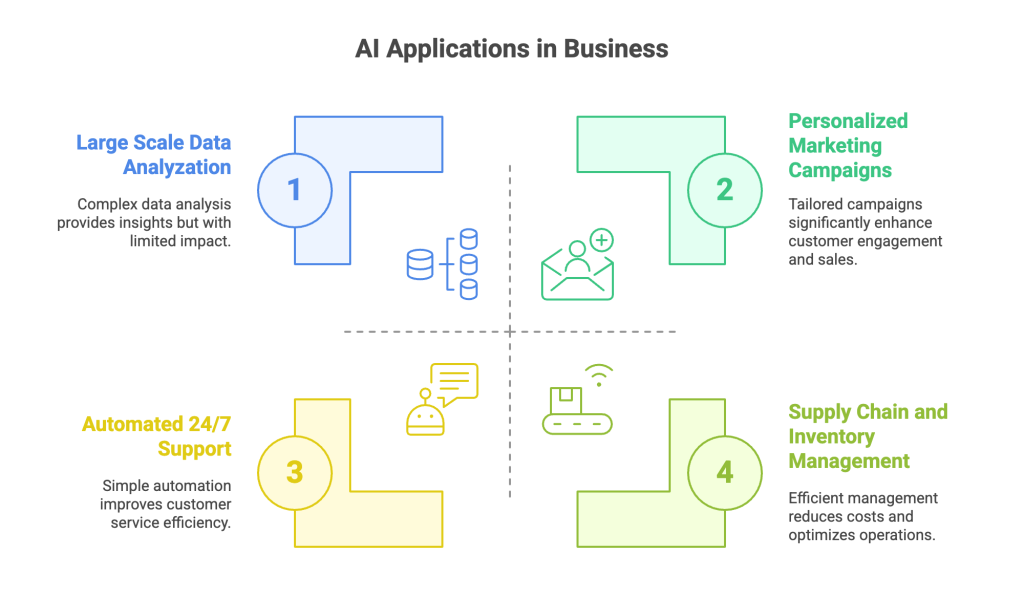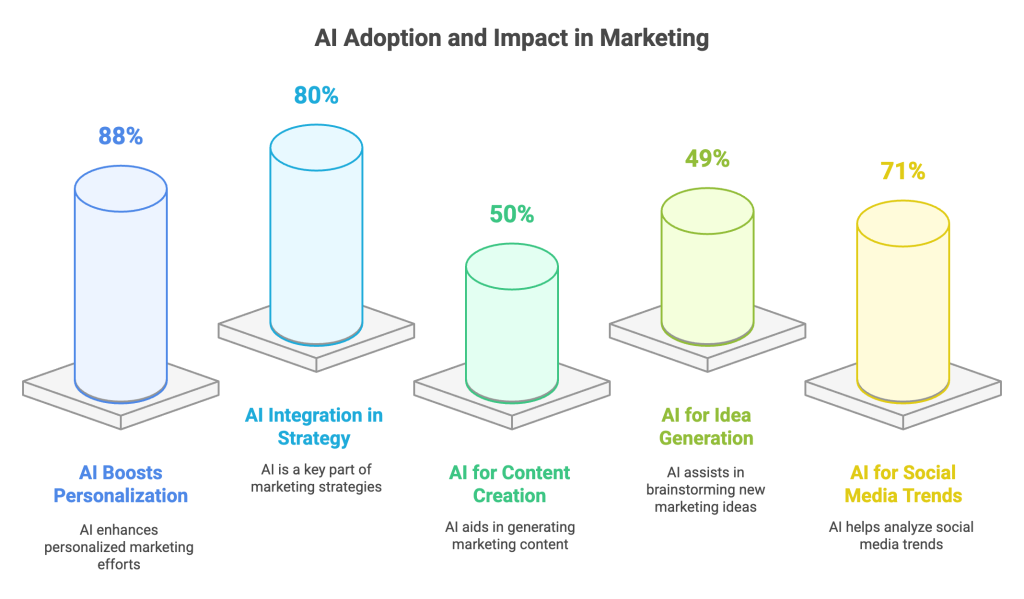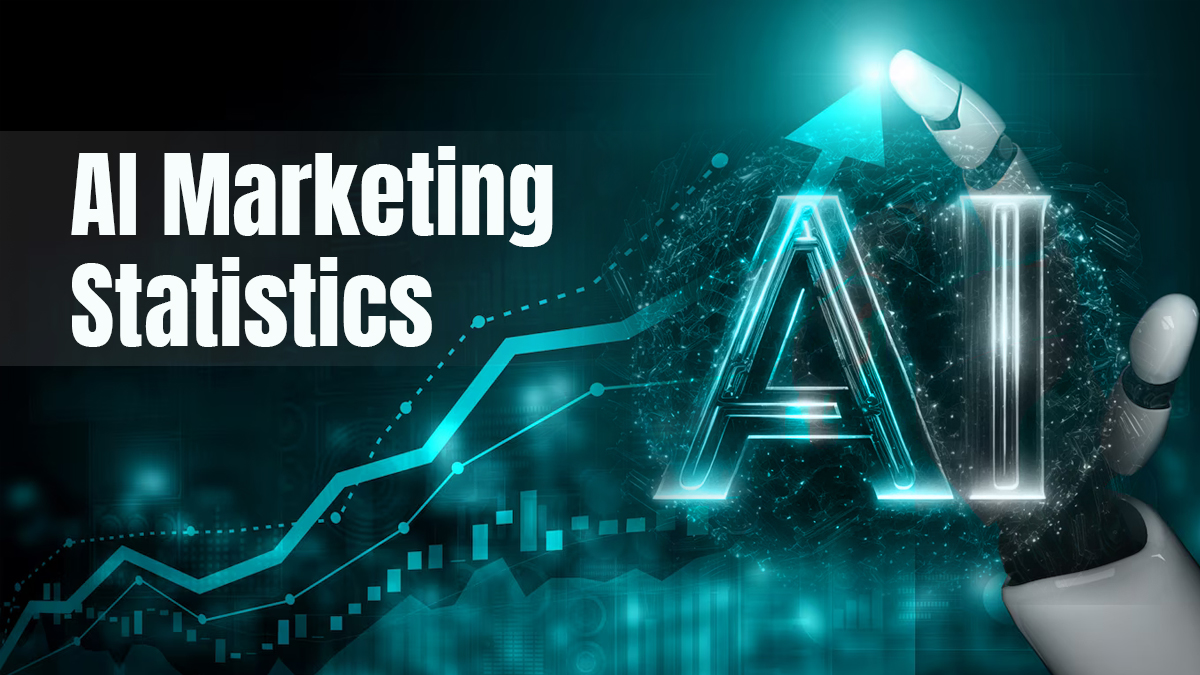AI has become one of the most important technologies of the 21st century, greatly changing many different fields. As companies, governments, and people use AI more in their work, it’s important to know the key facts that define this technology.
The AI Marketing statistics in this post provide important information about how AI is affecting us now, what it can do in the future, and the challenges it brings. They are helpful for understanding the tricky and ever-changing future of how AI will fit into our lives.
AI is not just about new technology; it also brings changes to society and the economy. AI is changing industries like healthcare, finance, and manufacturing, transforming job markets and affecting how people shop.
Table of Contents
- 1 The Growth of AI in Business
- 2 Top AI Marketing Statistics (2025 Edition)
- 3 Statistics for General AI
- 4 AI Marketing Statistics
- 5 Why AI Marketing Statistics Matter
- 6 Generative AI in Marketing
- 7 Consumer Behavior & Personalization
- 8 Key AI Statistics
- 9 Statistics for AI Growth
- 10 Statistics on AI Concerns
- 11 Risks, Ethics, and Privacy Concerns
- 12 Statistics for AI Adoption
- 13 AI’s Impact Across Industries
- 14 Statistics for AI Natural Language Processing (NLP)
- 15 Statistics for AI Business
- 16 Statistics for AI Contact Center
- 17 Statistics on AI Security
- 18 Statistics on AI Jobs
- 19 AI Jobs & Workforce Insights
- 20 FAQs
The Growth of AI in Business

Automated 24/7 Support
AI assistants are changing customer service by providing help all day and night, making the experience better for customers. Unlike regular human support, these AI systems can answer many questions at the same time without needing breaks.
Using machine learning and NLP, AI can quickly and accurately understand and answer customer questions. These systems learn from experiences and get better at what they do as time goes on. AI SEO is gaining momentum as businesses increasingly rely on artificial intelligence to optimize content and improve search performance.
For businesses, using AI support saves money because they don’t need as many people working in customer service. Also, AI can quickly answer common questions and solve simple problems, allowing human workers to concentrate on harder tasks.
Personalized Marketing Campaigns
AI helps create campaigns that are tailored to individual needs. By looking at customer data like what they browse, what they buy, and their age or location, AI can guess what they like and customize marketing messages just for them.
This kind of personalization makes sure that customers get useful content, deals, and suggestions, which helps them connect more and make purchases. AI marketing statistics indicate AI tools, like predictive analytics, can group audiences better.
This helps send personalized emails, social media ads, and website content. Personalized marketing makes customers happier by giving them what they really want, and it also helps increase a brand’s sales.
Also Read: 140 Best SEO Prompts for ChatGPT
Customer Behavior Prediction
AI is being used more and more to predict how customers will behave, giving businesses helpful information about what customers might do in the future. By looking at a lot of data from different places, like previous purchases, web browsing, social media, and personal details, AI can find patterns and trends that people might miss.
This ability to predict helps businesses make smart choices, whether it’s about creating new products, managing stock, or focusing their marketing efforts. For example, AI can predict which products people will want to buy.
This helps companies get ready by having the right amount of stock so they don’t have too much or too little. In the same way, AI can help businesses see when customers might leave. This lets them take steps to prevent important clients from leaving.
Quality Assurance in Contact Centers
In the past, making sure contact centers were doing a good job meant that people had to closely watch and check a lot of customer-agent interactions manually. AI is making this easier by automatically checking every call, chat, or email.
It gives scores based on things like how fast the response is, how correct the information is, the tone used, and how happy the customer is. Machine learning models can spot areas where things can be better, providing quick feedback to help you do a better job.
Also, AI can find common problems that customers face when interacting with a business. This helps businesses understand what needs to be improved in their products, services, or training and saves time and money.
Large Scale Data Analyzation
As more data is generated by customers, companies need better tools to study it and find useful information. AI helps businesses handle and understand large amounts of data much better than humans can.
Machine learning tools and smart analysis can look through information from different sources, like social media, websites, customer reviews, and sales data, to find patterns, trends, and what people like.
AI can find connections in the data that are not obvious, which helps businesses make decisions based on the data. For instance, AI can figure out what influences customers to buy things or guess future sales trends by looking at past data.
Supply Chain and Inventory Management
AI is changing the management of supply chains and inventory by making predictions more accurate, making operations smoother, and lowering expenses. In the past, supply chains used manual processes or simple software to keep track of inventory, forecast demand, and improve logistics.
AI can look at a lot of data from different places, like sales trends, seasons, and market conditions, to better guess what people will want to buy. This helps businesses keep the right amount of stock so they don’t have too much or too little, which can save them money.
AI systems can spot possible problems in the supply chain, like delays from suppliers or transport issues, and offer quick alternative solutions. Also, AI can help find the best delivery paths and times, making things run smoother and saving money.
Top AI Marketing Statistics (2025 Edition)
- 88% of marketers say AI helps personalize customer experience
- 46% of businesses using AI saw increased revenue in marketing
- 73% of companies already use AI or plan to in the next year
Statistics for General AI
- 73% of companies are using or planning to use both regular AI and generative AI.
- 72% of companies say they use AI for at least one part of their business.
- 67% of businesses plan to spend more money on AI in the next three years.
- 67% of the top companies are seeing how useful generative AI is for improving their products and services.
- 65% of companies say they use generative AI in at least one part of their business regularly.
- 63% of companies are spending more on cloud services to use generative AI.
- Labor productivity could grow by 0.1% to 0.6% each year until 2040 if businesses start using generative AI.
- One out of five in the US content creators used AI to make changes to their work and to create pictures and videos.
- One in three marketers and advertisers in Europe, North America, and South America used generative AI for research.
AI Marketing Statistics
- 7 out of 10 people in the US marketers said they are using generative AI tools to help them in their jobs.
- 88% of marketers using AI say it has helped them make the customer experience more personal on various platforms.
- More than 80% of marketers around the world use some type of AI in their online marketing efforts.
- AI marketing statistics imply 52% of US marketers using AI tools in their projects mentioned that faster work and better organization were their top advantages.
- More than half of marketing and advertising workers in Europe, North America, and South America said they used generative AI to help write content.
- 52% of marketers in the US who use AI tools say they work faster and more efficiently, says one of the AI marketing statistics.
- 51 out of every 100 marketers in the US said that AI tools have made it easier for them to handle their data.
- Half of the marketers are already using AI in their marketing plans.
- About 49% of marketers and advertisers in Europe, North America, and South America say they used generative AI to help come up with ideas.
- 46% of businesses that use AI said they made more money in marketing and sales.
- 37% of companies that use AI said they spent 10-19% less on marketing and sales.
- 34% of companies say they use generative AI to help create content for their marketing plans.
- AI marketing statistics denote 29% of marketing leaders want to use AI in the future.
- We can see from AI marketing statistics that 23% of businesses use generative AI to personalize their services.
- About 10% of the marketers said they don’t plan to use AI.
- Most of the marketers asked are positive about how AI has improved their view of how it can be used and what it can do.
- About 90% of people surveyed say they will set aside part of their budget for marketing AI tools, and spending is expected to increase next year.
- In the past year, 80% of marketers found that AI tools brought in more returns than they expected.
- More than 40% of people are concerned that AI might take away some marketing jobs, but 97% think it will help their careers. Only 3% expect it to have a bad effect.
- A study by Adobe found that 15% of businesses are already using AI for marketing, and another 31% plan to start using it in the next year.
- A new report shows that the worldwide market for using AI in marketing is expected to grow to $21.52 billion by 2028. This means it will increase by 20.9% each year from 2021 to 2028.
- A survey by Forrester found that 53% of marketing leaders either use or plan to use AI to predict trends and understand their customers better.
- Gartner expects that this year, 75% of medium-sized and large companies will use AI tools to create personalized marketing content.
- Statista says that 55% of marketers use AI to divide people into groups and target them.
- A study found that 71% of businesses use AI to understand social media better and make their marketing plans stronger.
- Adobe found that 46% of marketers use AI to improve their ads and target the right people.
- A new study found that 41% of businesses use AI to make shopping more personal for their customers.
- A study by Influence Marketing Hub showed that 20% of marketing groups are spending more than 40% of their budget on campaigns using AI.
Also Read: Stay Ahead of the Curve: 32 ChatGPT SEO Examples That Give You the Competitive Edge
Why AI Marketing Statistics Matter
With 88% of marketers confirming that AI boosts personalization and over 80% already integrating it into their strategy, AI isn’t a buzzword — it’s the present and future of marketing.
Generative AI in Marketing
Marketers are using generative AI more and more for creating content, coming up with ideas, and running campaigns. These numbers show the change:
- More than half of marketers use AI to help them create content.
- 49% say it helps come up with new ideas.

Consumer Behavior & Personalization
It’s now easier to guess what buyers want and create messages for them using AI.
- 88% of marketers who use AI say that personalization has gotten better.
- 71% use AI to study trends on social media.
Key AI Statistics
- 73% of people in the US thought that AI and machine learning could change how customers feel about their experience.
- 48% of customers in the US say they would use AI more often if it made their experience with a brand easier, more reliable, and more convenient.
- 30% of the marketers think that generative AI could be a big risk for brand safety and spreading false information.
- 23% of Gen Z use AI and chatbots to search for information on the internet.
- 16% of the US people aged 35 to 44 said they find images made by brands and advertisers using generative AI very attractive.
- 12 out of every 100 people in the US aged 18 to 34 said that images made by generative AI are very attractive in social media ads, especially when influencers create or share them.
Statistics for AI Growth
- By 2030, AI is expected to add around $16 trillion to the world economy.
- Generative AI could add between $2.6 trillion and $4.4 trillion each year to the world economy through various uses.
- From 2024 to 2030, it is expected that the growth rate of AI around the world will be 37% each year.
- By 2030, the world’s economy is expected to be up to 14% larger because more people will be using and developing AI.
- A new report says that using AI in the energy industry is expected to be worth $7.78 billion by 2026.
- A recent report says that the AI used in education is predicted to grow to $3.68 billion by 2025.
Statistics on AI Concerns
- 63% of people say that inaccuracies in AI are a risk for organizations.
- 52% of people think that using generative AI can lead to problems with stealing ideas and inventions, which is a risk for businesses.
- Almost half of the marketers are worried about data privacy and ethics in AI.
- 46% of companies put money into responsible AI practices to make their business and products stand out.
- 44% of organizations put money into responsible AI practices to better handle the risks that come with AI technologies.
- Better customer experience is the main advantage of using responsible AI practices, according to 41% of people.
- Better online safety and risk management is the second biggest advantage of using responsible AI practices, according to 40% of those surveyed.
- 39% of organizations spend money on responsible AI practices to follow rules and regulations.
- 35% of marketers are worried about the cost of using AI tools.
- About 23% of people said they have faced problems because generative AI makes mistakes.
- About 16% of people surveyed said their organizations have faced problems because of cybersecurity issues with generative AI.
Risks, Ethics, and Privacy Concerns
AI has some concerns: keeping data private, misinformation, bias in decisions, and losing jobs.
- 63% are concerned about mistakes made by AI.
- 52% are worried about people stealing their ideas.
Statistics for AI Adoption
- Statista says that the worldwide market for AI in self-driving cars will grow to $36 billion by 2025.
- Gartner believes that by 2023, 70% of customer service teams will use AI-powered virtual assistants.
- A PwC survey showed that by 2019, 54% of healthcare companies were using AI technology.
- A report from Tractica says that spending on AI in manufacturing is expected to be $15.7 billion by 2025.
- Deloitte found that 84% of finance leaders think that AI will be very important for their business success in the next two years.
- A new study predicts that by 2024, 32% of money made by the travel industry will be affected by AI in some way.
- A recent study found that 51% of online stores use AI to make shopping better for customers.
AI’s Impact Across Industries
Segment by industry:
- Auto: The market for self-driving cars will be worth $36 billion by 2025.
- Healthcare: 54% of companies started using it as early as 2019.
Statistics for AI Natural Language Processing (NLP)
- A survey by Statista says that by 2022, there will be nearly 8.4 billion voice assistants being used around the world.
- A report from Voicebot says that Amazon’s Alexa is the most popular voice assistant in the US with 74.2 million people using it, followed by Apple’s Siri with 48.4 million users and Google Assistant with 41.4 million users.
Statistics for AI Business
- A report from IDC says that people around the world will spend about $97.9 billion on AI systems in 2023. This shows that a lot of money is going into AI technology and its support systems.
- A survey by Gartner found that 37% of organizations are using AI in some way, which is a 270% rise since 2015.
- A study by Salesforce showed that 51% of small businesses are currently using AI, and 27% plan to start using it in the next two years.
- A report from Juliety in 2024 says that 91% of the biggest companies in the world are still investing in the AI industry.
- Statista says that using AI can help businesses make 6% to 10% more money on average.
- AI could help workers produce 1.5% more over the next ten years.
- By August 2023, more than 80% of the top 500 companies in the US started using ChatGPT in their work.
Statistics for AI Contact Center
AI is changing support services by helping companies respond faster, train their agents, and keep track of performance on a large scale. Here are some statistics:
- Invoca’s research shows that 85% of call center managers are expected to start using AI-powered conversation tools in the next year.
- According to Invoca’s State of the Contact Center Report, 62% of contact center managers said that they can’t check enough calls to properly assess how well their agents are doing without AI.
- A new report by Invoca found that 61% of contact center managers believe they need AI to help improve coaching for their agents.
- Contact center managers who use conversation analysis tools report that their agents are 50% more likely to feel very happy about the coaching they get.
- 47% of customer service agents believe the best way to assess calls is by combining both AI and human reviews.
- 60% of contact centers that do well on more than half of their phone calls use AI to help with the process.
Statistics on AI Security
- A new report says that the use of AI in cybersecurity is expected to increase from $8.8 billion to $38.2 billion by 2026.
- A study by Capgemini found that companies using AI for their cybersecurity saw a 12% better improvement in spotting and reacting to threats.
- Deloitte found that 69% of companies use AI or machine learning to catch and stop fraud.
- A new study says that the market for video analysis, which includes facial recognition, will be worth $11.7 billion by 2026.
- McKinsey found that AI might be able to handle about 45% of cybersecurity jobs on its own.
- Companies that use AI for security have cut their response times to breaches by almost 30%, making it easier to handle incidents.
- Email security tools that use AI are more than 40% better at finding and stopping harmful messages than regular tools.
- AI finds 98% of known viruses, which is better than the 85% detection rate of regular antivirus software.
- AI-based threat intelligence tools can predict phishing attacks with 85% accuracy, helping to improve defense strategies.
- Companies that invest in AI and security automation have found that they can stop targeted cyberattacks four times better, which saves them a lot of money.
Statistics on AI Jobs
- The Future of Jobs Report 2023 says that jobs for AI specialists are expected to grow by 40%, leading to 1 million new jobs in AI and machine learning.
- A report from the World Economic Forum says that by 2025, AI and automation will take away 85 million jobs, but they will also create 97 million new jobs around the world in different fields.
- A survey by IBM showed that 81% of CEOs think AI skills are important for their company’s future, and 78% plan to focus on training their employees in AI and automation skills.
- More than 90% of marketers say that having AI skills will be essential in 2025 and later.
- A survey found that 58% of HR leaders have put money into or plan to put money into AI for hiring and checking job candidates.
- A study by McKinsey found that around 60% of jobs have at least 30% of their activities that could be automated.
- The number of people working in AI around the world is likely to increase by 22% every year until 2030.
- AI engineers make about $145,898 a year, whereas data scientists earn about $129,640, and robotics engineers get around $96,013.
AI Jobs & Workforce Insights
| Role | Avg Salary |
| AI Engineers | $145,898 |
| Data Scientists | $129,640 |
| Robotics Engineers | $96,013 |
Wrapping Up
AI statistics show that technology is changing quickly and impacting the world economy and society. The data shows that AI has a big impact on industries, jobs, and daily life. As we keep using AI and its possibilities, it’s important to see both the benefits and difficulties it brings.
AI helps make things faster, more efficient, and innovative, but it also brings up concerns about people losing jobs, keeping data private, and doing the right thing ethically. Companies are increasingly depending on AI for important tasks like customer service, marketing, and managing supplies.
It’s important to think carefully about how AI will affect society as we develop it in the future. By keeping up with AI facts and figures, companies, government leaders, and people can get ready for the chances and challenges that come with it.
FAQs
Can AI take over human jobs?
AI is expected to take away some jobs and also create new ones. Simple, everyday jobs in industries like manufacturing, customer service, and data entry are being taken over by machines. This is causing some people to lose their jobs. But AI also creates new jobs, like data scientists, AI experts, and machine learning engineers. Also, AI makes work easier in many fields, helping workers spend more time on important and creative tasks.
Is AI a danger to our privacy?
AI can look at and work with a lot of personal information, which raises big worries about privacy. AI systems usually need user data to get better at their tasks, but this data could be misused if there aren’t enough protections in place. To reduce these risks, rules like the General Data Protection Regulation (GDPR) in Europe have been created to make sure that AI systems are clear, fair, and protect people’s privacy.
Which industries are impacted the most by AI?
In healthcare, AI helps doctors find out what diseases patients have, create customized treatment plans, and even perform surgery using robots. In finance, AI helps find fraud, makes trading decisions automatically, and improves customer service. The retail industry uses AI to create personalized ads, manage stock better, and improve the shopping experience for customers. In manufacturing, AI helps predict when machines need fixing, improves work schedules, and enhances quality control.
Can AI make decisions?
AI programs look at a lot of data and find patterns or trends that help with making decisions. For example, AI is used in banks to check if someone can get a loan, or in hospitals to recommend treatment options. AI decision-making systems are made to help reduce mistakes made by people and to work more efficiently. It’s important to remember that even though AI can make decisions using data, those decisions usually follow specific rules and guidelines.
What are the ethical issues in using AI?
AI brings up important ethical questions, especially about bias and fairness. AI systems can unintentionally keep existing social biases if they learn from biased information. This can result in unfair results in areas like job hiring, law enforcement, and loans. People are worried about transparency because many AI models are like “black boxes”. To have good standards, we have to ensure AI systems are clear, responsible, and created to reduce harm to people and society.



























